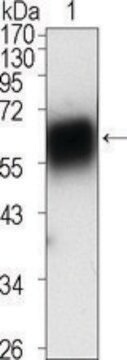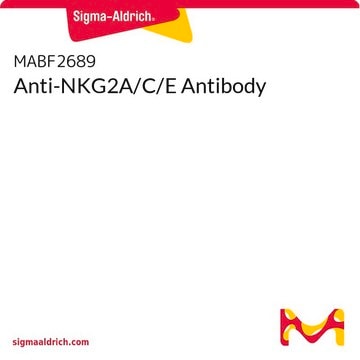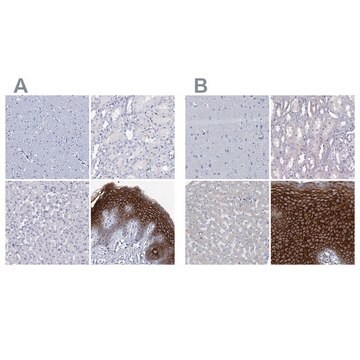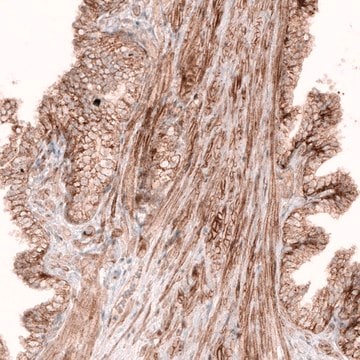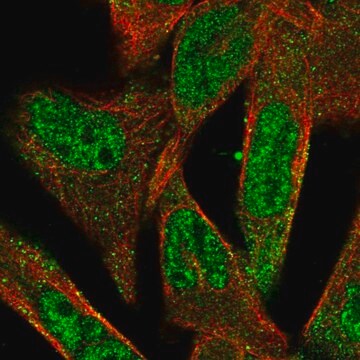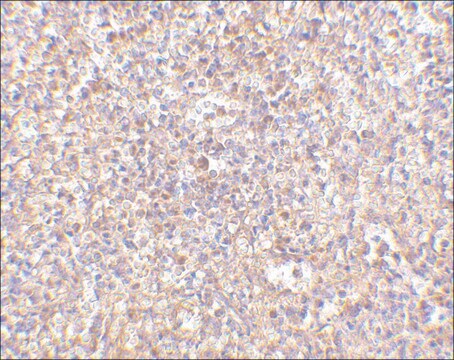MABS1152
Anti-ROR2 Antibody, clone Nt 2535-2835
clone Nt2535-2835, from mouse
Synonyme(s) :
Tyrosine-protein kinase transmembrane receptor ROR2, mRor2, Ntrkr2, Neurotrophic tyrosine kinase receptor-related 2
About This Item
Produits recommandés
Source biologique
mouse
Niveau de qualité
Forme d'anticorps
purified immunoglobulin
Type de produit anticorps
primary antibodies
Clone
Nt2535-2835, monoclonal
Espèces réactives
mouse, human
Technique(s)
ELISA: suitable
immunohistochemistry (formalin-fixed, paraffin-embedded sections): suitable
western blot: suitable
Isotype
IgG1κ
Numéro d'accès UniProt
Conditions d'expédition
wet ice
Modification post-traductionnelle de la cible
unmodified
Informations sur le gène
human ... ROR2(4920)
Catégories apparentées
Description générale
Spécificité
Immunogène
Application
Immunohistochemistry Analysis: A representative lot detected Ror2 expression in various regions of wild-type and Ror2+/-, but not Ror2-/-, mouse E13.5 embryos by both fluorescent and non-fluorescent immunohistochemistry using paraformaldehyde-fixed, paraffin-embedded whole mount sections (Mikels, A., et al. (2009). J. Biol. Chem. 284(44):30167-30176).
Immunohistochemistry Analysis: A representative lot detected Ror2 expression in the dermis of wild-type, but not Ror2-knockout mouse skin from E16.5 mouse embryos using paraformaldehyde-fixed, paraffin-embedded whole mount sections (van Amerongen, R., et al. (2012). Dev. Biol. 369(1):101-114).
Western Blotting Analysis: A representative lot detected full-length murine Ror2, as well as Ror2 deletion constructs lacking the first Ser/Thr-rich domain (ST1; a.a 753-782) or the Pro-rich domain (a.a. 784-857), but not Ror2 deletion mutants lacking the ST2 (a.a. 859-882) domain (Mikels, A., et al. (2009). J. Biol. Chem. 284(44):30167-30176).
Enzyme-linked Immunoabsorbent Assay (ELISA): The immunoreactivity of a representative lot toward the immunogen MBP fusion protein was confirmed by ELISA (Mikels, A., et al. (2009). J. Biol. Chem. 284(44):30167-30176).
Signaling
Kinases & Phosphatases
Qualité
Western Blotting Analysis: 0.5 µg/mL of this antibody detected ROR2 in 10 µg of MEF-1 cell lysate.
Description de la cible
Forme physique
Stockage et stabilité
Autres remarques
Clause de non-responsabilité
Vous ne trouvez pas le bon produit ?
Essayez notre Outil de sélection de produits.
Code de la classe de stockage
12 - Non Combustible Liquids
Classe de danger pour l'eau (WGK)
WGK 1
Point d'éclair (°F)
Not applicable
Point d'éclair (°C)
Not applicable
Certificats d'analyse (COA)
Recherchez un Certificats d'analyse (COA) en saisissant le numéro de lot du produit. Les numéros de lot figurent sur l'étiquette du produit après les mots "Lot" ou "Batch".
Déjà en possession de ce produit ?
Retrouvez la documentation relative aux produits que vous avez récemment achetés dans la Bibliothèque de documents.
Notre équipe de scientifiques dispose d'une expérience dans tous les secteurs de la recherche, notamment en sciences de la vie, science des matériaux, synthèse chimique, chromatographie, analyse et dans de nombreux autres domaines..
Contacter notre Service technique